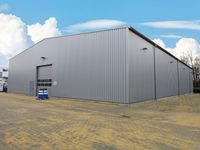The Masterflex Group is in the process of undertaking a large-scale expansion of its warehousing and production capacity. A warehouse with a floor space of some 850 m2 is currently being put into operation at the group's headquarters located on the Willy-Brandt-Allee in Gelsenkirchen. This is just the first stage of a planned major extension of the premises; the work is to be carried out during the coming year.
"We needed to upgrade in this way to ensure that we could continue to offer our customers an excellent level of product availability. Moreover, we also plan to broaden our scope of production and update our set of skills," says Dr. Andreas Bastin, CEO of the Masterflex Group. "Because of the considerable demand for our special tubing products, delivery times for certain articles have become longer than we consider appropriate."
The Masterflex Group, the market leader in sophisticated connection and tubing system technology, will be investing some €7 million in the planned expansion. "We hope that the expenditure will not only give a boost to our headquarters here but also provide a secure future for our workforce in terms of their jobs," adds Bastin.
The construction of the new warehouse to the east of the personnel car park has just been completed. It is to be used for the storage of finished articles. Later in the year, other construction projects will be initiated: the 'beating heart' of the group, its production facility, is to be extended and modernised.
The two-storey annex will add some 1200 m2 to the available production floor while another 3500 m2 of supplementary storage space is to be created here. An additional 1200 m2 will provide a flexible space that can be used for production and development work and/or storage as necessary. Also to be constructed are more administrative offices, particularly for the development and production technology sectors, a large modern raw material warehouse, further laboratories and improved loading and unloading zones on the site.
These will facilitate delivery as it will be possible in future for vehicles to bypass the building and thus speed up the loading and unloading procedures. "This will enable us to further significantly increase the efficiency of our processes," concludes Bastin.
The conversion and extension work should be completed by late 2016.





